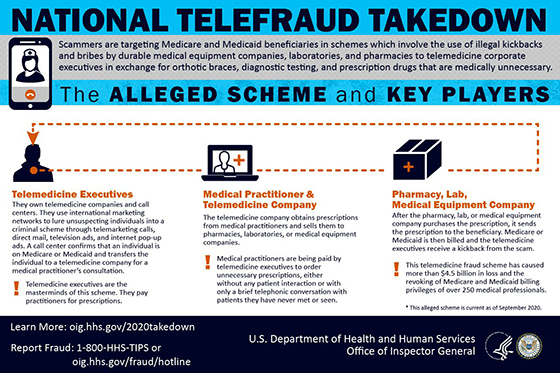Recently, the Department of Justice (DOJ) and the Department of Health and Human Services (HHS) Office of Inspector General (OIG) announced the completion of the 2020 National Health Care Fraud Takedown, involving 345 defendants in 51 judicial districts charged with participating in healthcare fraud schemes that resulted in more than $6 billion in alleged losses to federal healthcare programs, including enforcement actions taken against telemedicine executives, owners of durable medical equipment (DME) companies, genetic testing laboratories, pharmacies, and more than 100 medical practitioners. The government also revoked federal healthcare billing privileges for 256 medical professionals. The schemes allegedly involved luring patients through various marketing tactics, such as telemarketing calls, direct mail, television advertisements, and internet pop-up advertisements, and illegal kickbacks made by telemedicine executives to medical practitioners to order unnecessary durable medical equipment, genetic and other diagnostic testing, and medications, with little or no patient interaction. The durable medical equipment, test results, or medications were often not provided to patients or were worthless. Many patients were misled, misdiagnosed, or delayed in obtaining the appropriate treatment. This takedown reflects the government's continued scrutiny of telehealth services arrangements.

Investors, companies that contract with telehealth service providers, medical practitioners, laboratories, pharmacies, and medical products suppliers and manufacturers should review their services arrangements carefully to avoid the referral and kickback risks characteristic of the schemes that OIG focused on in its recent takedown and enforcement actions, including the following aspects of telehealth services:
- Marketing strategies;
- Provider-patient relationships;
- State licensure and telemedicine requirements;
- Kickbacks and referrals with other parties, including medical practitioners, laboratories, pharmacies, and suppliers and manufacturers of medical products;
- Coding and billing practices; and
- Fee arrangements among the parties.
With increased utilization of telehealth services as a result of the COVID-19 pandemic, enforcement action in this space is expected to increase significantly in the coming years.1
[1] Recent examples of enforcement actions taken against telemedicine companies include: DOJ Press Release (February 5, 2020), “Two Owners of Telemedicine Companies Charged for Roles in $56 Million Conspiracy to Defraud Medicare and Receive Illegal Kickbacks in Exchange for Orders of Orthotic Braces”; DOJ Press Release (April 23, 2020), “Telemedicine company owner charged in $60 million fraud scheme”; DOJ Press Release (May 13, 2020), “Durable medical equipment company owner charged in kickback scheme”; and DOJ Press Release (June 11, 2020), “Florida man charged in telemedicine scheme.”